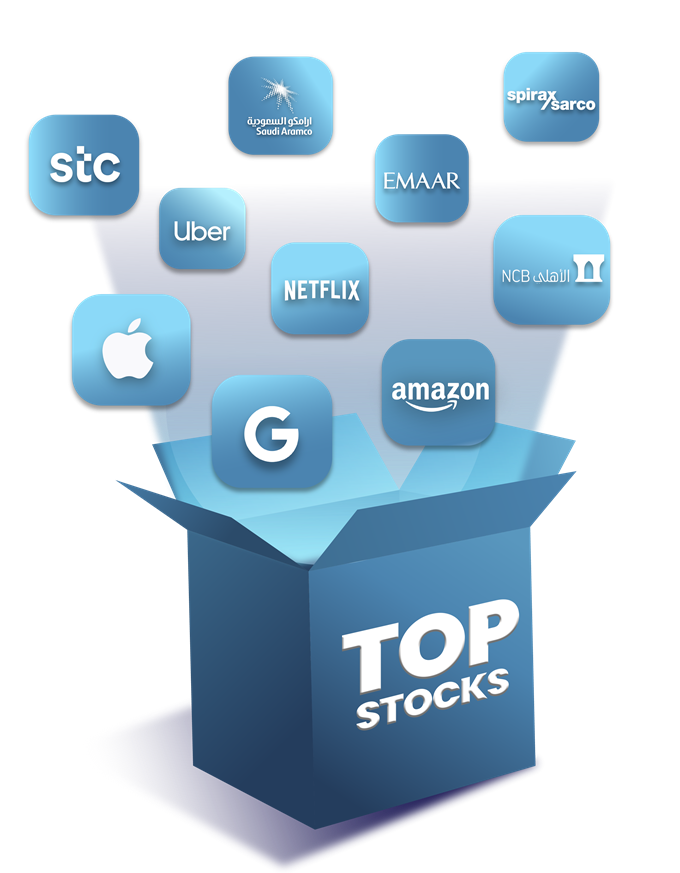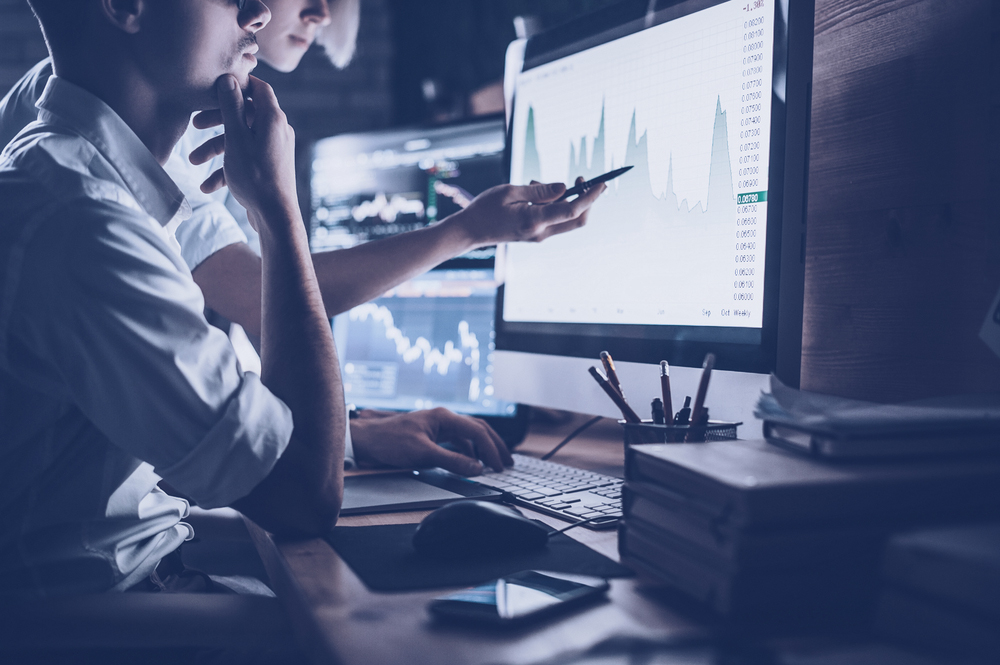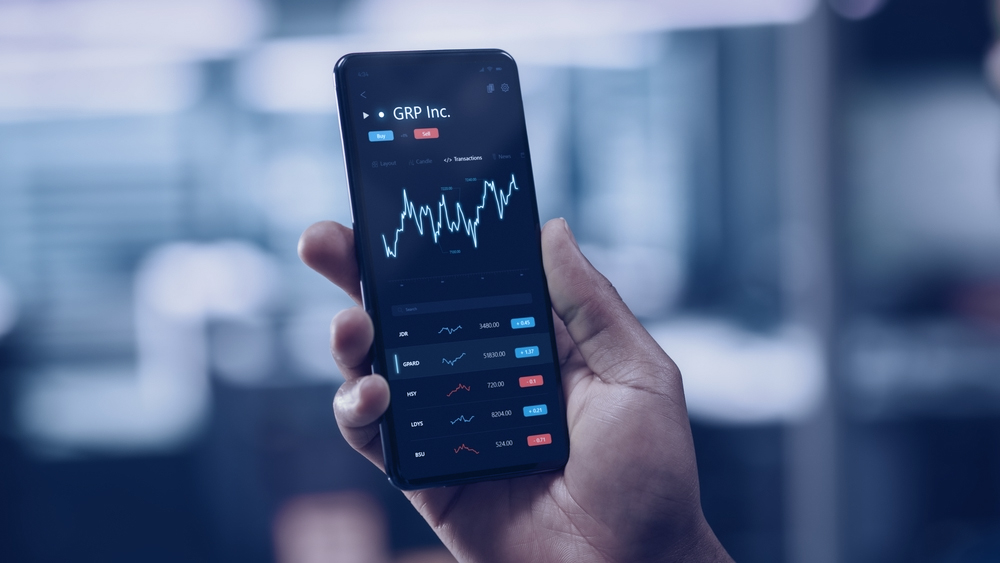Stock Market
Build wealth by investing in the stock market with Mubasher Capital.
Gain access to blue-chip companies that boast proven track records, deliver strong returns, pay dividends, and regularly increase payouts.


Lowest Commissions on Online Stock , ETF, and Options Trade
U.S. Exchange-listed stocks, ETFs, and options
Invest in Blue-Chip companies Worldwide
Apple, Aramco, Alba, Emaar, KFH, Comi, and more


Why choose Mubasher Capital for stock trading
No subscription or platform fees – Access our trading platforms, streaming news, and expert research without additional costs.
- Intelligent order routing – Quickly route your stock orders to pursue the best available price.
- Powerful stock trading platforms – Utilize Mubasher Trade Pro or MTplus to maximize your trading potential.
- Free independent research – Benefit from market insights and ideas from third-party market experts and our in-house research team.
In-depth ETF Trading
Invest in sectors, industries, indices, or countries with ETFs. Hedge or partially offset risks in your portfolio. Mubasher Capital’s platform combines the diversification of mutual funds with the liquidity of stock trading, offering a cost-effective approach with numerous benefits.

Unlock Wealth: Sign Up Now for Smart Investing Success!
FREQUENTLY ASKED QUESTIONS General Questions
Global stock investing involves investing in stocks from companies around the world, rather than just in your home country. This strategy allows investors to diversify their portfolios across different regions, industries, and economies, potentially reducing risk and capturing opportunities for growth in various markets.
Investing in global stocks means buying shares of companies from around the world, which offers more diversification and access to a wider range of growth opportunities compared to just investing in domestic stocks.
1. Diversification: Spread risk by investing in different countries.
2. Growth Opportunities: Access fast-growing industries and economies.
3. Hedging: Offset losses in one market with gains in another.
4. Currency Diversity: Protect against currency risk.
5. Portfolio Growth: Increase potential returns compared to just domestic investing.
Your investments are managed by professionals known as asset managers or portfolio managers. These individuals or teams are responsible for making decisions about where to invest your money based on your financial goals, risk tolerance, and market conditions.
The assets managed depend on your goals, but typically include stocks, bonds, real estate, mutual funds, ETFs, cash equivalents, and alternative investments.
A diversified global portfolio reduces risk by spreading investments across countries and industries, provides access to growth opportunities worldwide, hedges against economic downturns, offers currency diversity, and potentially enhances overall portfolio performance.
Practical Questions
Stock markets, bond markets, commodity markets, foreign exchange markets, and cryptocurrency exchanges are platforms where shares of publicly traded companies are traded. Bond markets involve debt securities issued by governments, municipalities, or corporations. Commodity markets trade commodities like gold, silver, oil, and agricultural products. Foreign exchange markets involve buying and selling currencies, while cryptocurrency exchanges facilitate the buying, selling, and trading of digital currencies. Each market offers unique investment opportunities.
Your risk tolerance is typically assessed through a questionnaire or discussion with your financial advisor. They’ll ask about factors like your investment goals, time horizon, financial situation, and how comfortable you are with the possibility of investment losses. This information helps determine the level of risk you’re willing and able to take on in your investments.
industries like semiconductors and solar energy are promising globally due to several factors:
Semiconductors: With the increasing demand for electronic devices, artificial intelligence, and cloud computing, the semiconductor industry is expected to grow significantly. Companies in this sector, like Nvidia, AMD, and Intel, play critical roles in powering various technologies worldwide.
Solar Energy: As the world shifts towards renewable energy sources, solar energy is becoming increasingly important. The solar energy industry is expected to expand rapidly as governments and businesses invest in clean energy solutions to combat climate change. Companies like First Solar and SunPower are leaders in solar panel manufacturing and installation, with global demand for solar energy continuing to rise. Investing in industries like semiconductors and solar energy can provide opportunities for growth and diversification in a global investment portfolio.
Through Mubasher Capital platform
Regular fees as per our fees structure, check this link
Pricing
Global stocks are generally more volatile than domestic stocks due to factors like currency fluctuations, geopolitical risks, economic diversification, and regulatory differences.
Currency fluctuations can impact your investments by affecting their value when converted back into your home currency. If the currency where your investment is located strengthens against your home currency, your investment may be worth more when converted. Conversely, if the currency weakens, your investment may be worth less.
A Global Depositary Receipt (GDR) represents shares in a foreign company and is traded on international stock exchanges. It allows investors to buy shares in foreign companies without dealing with different currencies or regulations. GDRs make it easier for companies to raise capital globally and for investors to access foreign markets.
Performance Questions
1. Diversify: Invest in different countries and industries to reduce risk.
2. Research: Understand global markets and economic trends.
3. Hedge: Protect against currency fluctuations.
4. Think Long-term: Focus on long-term growth to handle short-term volatility.
5. Monitor: Regularly review and adjust your investments.
1. Financials: Look at profitability, growth, and debt levels.
2. Market position: Evaluate their market share and competitive advantage.
3. Management: Assess the experience and track record of the management team.
4. Industry trends: Consider the overall health and growth prospects of the industry.
5. Country risk: Evaluate political and economic stability in the countries they operate in.
1. Currency Rates: Exchange rate fluctuations impact stock values.
2. Economic Health: Watch GDP, inflation, and unemployment for economic trends.
3. Geopolitical Stability: Trade tensions and conflicts affect stocks.
4. Commodity Prices: Changes in oil, gold, etc., influence related stocks.
5. Industry Trends: Tech, healthcare, etc., trends affect global stocks.
6. Interest Rates: Central bank policies impact global stock prices.
Globally, stocks have historically trended upwards over the long term, but with periods of volatility. Here’s a quick summary:
Average Annual Returns: Around 8-10% (depending on the index used)
Volatility: Expect fluctuations and occasional downturns.
Through the platform
You can do that easily at any time as per your convenience
Sharia
Yes, there are Sharia-compliant portfolios. They follow Islamic standards including: Industry Screening: Avoiding investments in alcohol, gambling, pork, conventional finance, pornography, tobacco, and weapons.
Financial Ratio Screening: Limiting debt, interest income, and ensuring appropriate liquidity levels.
Income Purification: Donating non-compliant income to charity.
Sharia advisory boards and indices like the Dow Jones Islamic Market Index ensure compliance.
Sharia compliance audits for these portfolios are typically conducted on a regular basis, often quarterly or annually. The frequency can vary depending on the specific fund or portfolio manager, but the goal is to ensure continuous adherence to Sharia principles. Regular audits are conducted by Sharia advisory boards comprising Islamic finance experts.
Yes and its available
Please contact our team and they will advise you regarding all the requirements fpr different portfolio.
Here are the specific risks associated with investing in Sharia-compliant portfolios:
1. Sector concentration risk
2. Lack of diversification
3. Performance variability
4. Liquidity risk
5. Compliance risk
Sharia-compliant portfolios may perform similarly to conventional portfolios over the long term but can show differences in the short term due to sector biases and exclusions. Comparisons depend on market conditions and individual investment strategies.
What is the process for reviewing and updating the Sharia compliance of the assets in the portfolio?
1. Check each asset vs. Sharia criteria.
2. Consult Islamic finance scholars for guidance.
3. Sell/replace non-compliant assets with Sharia-compliant ones.
Yes, Sharia-compliant portfolios can be customized for risk tolerance and investment goals. Just like traditional investing, you can choose a mix of Sharia-compliant stocks, sukuks (Islamic bonds), and real estate investments to match your risk appetite. For example, if you’re young and comfortable with higher risk, you might choose a portfolio with more growth-oriented Sharia stocks. Conversely, someone nearing retirement might prioritize income-generating Sukuk or Sharia-compliant real estate investment trusts (REITs).
Yes, US markets do have Sharia-compliant stocks. These are stocks in companies that meet Islamic investment principles. There are even Sharia-compliant indexes that track these stocks, such as the S&P 500 Shariah Index.
